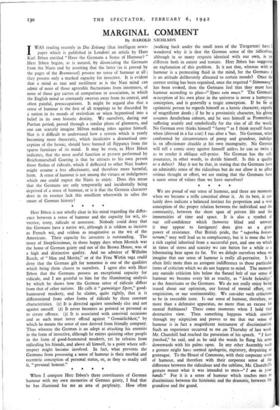MARGINAL COMMENT
By HAROLD NICOLSON
IWAS reading recently in Die Zeitung (that intelligent news- paper which is published in London) an article by Hans Karl Ibben entitled "Have the Germans a Sense of Humour?" Herr Ibben begins, as is natural, by dissociating the Germans from the Nazis and by asserting that the latter (as is proved by the pages of the Brennessel) possess no sense of humour at all ; they possess only a marked capacity for invective. It is evident that a mind as taut and rectilinear as is the Nazi mind can admit of none of those agreeable fluctuations from intentness, of none of• those gay curves of comparison or association, in which the English mind so constantly swerves away from its central, and often painful, preoccupations. It might be argued also that a sense of humour is the first of all trappings to be discarded by a nation in its moods of revivalism or when hypnotised into a belief in its own historic destiny. We ourselves, during our Puritan period, passed through a similar phase of glumness, and one can scarcely imagine Milton making jokes against himself. Nor is it difficult to understand how a system which is yearly becoming more theocratic, which inculcates a dramatised con- ception of the heroic, should have banned all flippancy from the sparse furniture of its mind. It may be even, as Herr Ibben
indicates, that the most useful function at present performed by Reichsmarschall Goering is that he attracts to his own person those flashes of ridicule, which if deflected to other Nazi leaders might assume a less affectionate, and therefore more harmful, form. A sense of humour is not among the virtues or indulgences which one could expect the Nazis to enjoy. Does this mean that the Germans are only temporarily and incidentally being deprived of a sense of humour, or is it that the German character does in its essence lack this emollient wherewith to salve the smart of German history?
* * * *


























 Previous page
Previous page